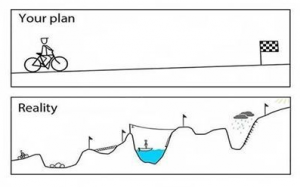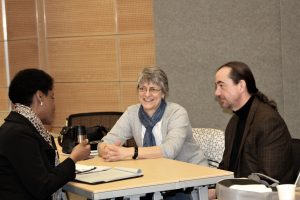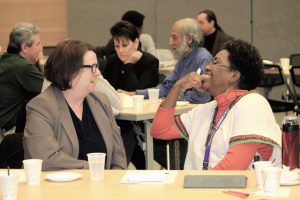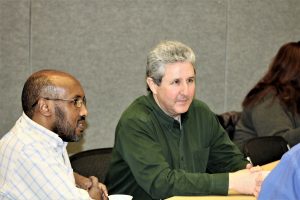Creating Success-Relying on Failure
 On Saturday, March 4, 2017, ELITE and Montgomery College Innovation Works sponsored a mini-conference, “Creating Success-Relying on Failure.” The focus was on shifting our beliefs about failure. The event touched on several important themes: the power of stories- the stories we tell ourselves and the stories we tell about others; the connection between growth mindset and learning, and the intellectual developmental phases students go through in relation to education. Dr. Ariel Phillips, founder and director of the Success-Failure Project at Harvard University and Ms. Jinai Gordon, Administrative Fellow for Harvard’s Bureau of Study Counsel, led the conversations and activities.
On Saturday, March 4, 2017, ELITE and Montgomery College Innovation Works sponsored a mini-conference, “Creating Success-Relying on Failure.” The focus was on shifting our beliefs about failure. The event touched on several important themes: the power of stories- the stories we tell ourselves and the stories we tell about others; the connection between growth mindset and learning, and the intellectual developmental phases students go through in relation to education. Dr. Ariel Phillips, founder and director of the Success-Failure Project at Harvard University and Ms. Jinai Gordon, Administrative Fellow for Harvard’s Bureau of Study Counsel, led the conversations and activities.
The Stories We Tell
 Dr. Phillips and Ms. Gordon each shared stories about failure and encouraged us to tell our own stories of failure. Ms.Gordon’s story demonstrated an experience in a math class shifted beliefs about her math abilities caused her to shift her academic major. Dr. Phillip’s story of her education provided a poignant illustration of how beliefs can shape experience and action. Dr. Phillip told an emotional story of how community college shifted her trajectory and beliefs about herself after dropping out of high school was a powerful illustration of the impact of beliefs on student success and the power of community college to change people’s lives. In the Harvard Success Failure project, stories are a core part of helping students re-conceptualize their notions of success and failure. For a little more discussion of the impact of storytelling on teaching consider NYU’s resources on storytelling in teaching and learning.
Dr. Phillips and Ms. Gordon each shared stories about failure and encouraged us to tell our own stories of failure. Ms.Gordon’s story demonstrated an experience in a math class shifted beliefs about her math abilities caused her to shift her academic major. Dr. Phillip’s story of her education provided a poignant illustration of how beliefs can shape experience and action. Dr. Phillip told an emotional story of how community college shifted her trajectory and beliefs about herself after dropping out of high school was a powerful illustration of the impact of beliefs on student success and the power of community college to change people’s lives. In the Harvard Success Failure project, stories are a core part of helping students re-conceptualize their notions of success and failure. For a little more discussion of the impact of storytelling on teaching consider NYU’s resources on storytelling in teaching and learning.
Growth Mindset- Carol Dweck
Dr. Phillips also introduced Carol Dweck’s concept of growth mindset vs. fixed mindset. Growth mindset, a popular topic in discussion of learning, emphasizes the belief that talents and capabilities can be developed as  opposed to a fixed mindset which emphasizes the belief that intelligence and capability has a fixed limit and capacity. As it applies to the teaching and learning, growth mindset encourages strategies and instructional practices which encourage and reinforce the idea that learning is a process rather than a product. When a faculty member and a student approach learning as a process rather than a product, the attention is focused on mastery of the concepts or skills, development of capacity, and higher levels of engagement and achievement. Dr. Phillip’s story about her statistics professor who, when a student answered incorrectly, used genuine curiosity in asking about the student’s thinking and process that led to the incorrect answer. She shared this example to illustrate how a teacher can use failure to foster growth mindset. Allyson Dever’s (2015) research follows how a growth mindset can improve academic performance. Carol Dweck, Gregory M. Walton, and Georffy Cohen illustrate and build on the idea of growth mindset in “Academic Tenacity: Mindsets and Skills that Promote Long-Term Learning.”
opposed to a fixed mindset which emphasizes the belief that intelligence and capability has a fixed limit and capacity. As it applies to the teaching and learning, growth mindset encourages strategies and instructional practices which encourage and reinforce the idea that learning is a process rather than a product. When a faculty member and a student approach learning as a process rather than a product, the attention is focused on mastery of the concepts or skills, development of capacity, and higher levels of engagement and achievement. Dr. Phillip’s story about her statistics professor who, when a student answered incorrectly, used genuine curiosity in asking about the student’s thinking and process that led to the incorrect answer. She shared this example to illustrate how a teacher can use failure to foster growth mindset. Allyson Dever’s (2015) research follows how a growth mindset can improve academic performance. Carol Dweck, Gregory M. Walton, and Georffy Cohen illustrate and build on the idea of growth mindset in “Academic Tenacity: Mindsets and Skills that Promote Long-Term Learning.”
Understanding the Intellectual Development of College Age Students- William Perry
 Dr. Phillips opened the conversation asking us to consider our students’ development through Dr. William Perry’s scheme for intellectual development. The basic idea is that students move from Dualism (a basic binary belief that knowledge is true or false, that there is a correct answer) through Commitment with relativism (recognition of learning as an ongoing activity). Based on Perry’s theoretical schema, Dr. Phillips illustrated how each individual student can experience the same class and same professor very differently since they can be in a different intellectual development phase. (See http://www.cse.buffalo.edu/~rapaport/perry.positions.html and http://ii.library.jhu.edu/2013/12/13/perrys-scheme-understanding-the-intellectual-development-of-college-age-students/ for basic overviews of Perry’s work).
Dr. Phillips opened the conversation asking us to consider our students’ development through Dr. William Perry’s scheme for intellectual development. The basic idea is that students move from Dualism (a basic binary belief that knowledge is true or false, that there is a correct answer) through Commitment with relativism (recognition of learning as an ongoing activity). Based on Perry’s theoretical schema, Dr. Phillips illustrated how each individual student can experience the same class and same professor very differently since they can be in a different intellectual development phase. (See http://www.cse.buffalo.edu/~rapaport/perry.positions.html and http://ii.library.jhu.edu/2013/12/13/perrys-scheme-understanding-the-intellectual-development-of-college-age-students/ for basic overviews of Perry’s work).
This Saturday morning conference is one of a number of conversations Montgomery College is having around connecting to students and helping all our students be successful.
Key questions to consider are: How can you use your own stories of failure to demonstrate resilience? How can you redesign your instructional practices to emphasize the process of learning and engage students in their learning rather than relying on their innate, fixed abilities?
Are you doing something in your classes you want to share? Consider writing an article: Learning Art of Science, A call for Submissions
For additional resources, please see the following provided by Dr. Ariel Phillips and Ms. Jinai Gordon:
Redefining Success and Failure
Edmondson, Amy C., “Strategies for Learning from Failure,” Harvard Business Review, April, 2011. https://hbr.org/2011/04/strategies-for-learning-from-failure
Intersectionality
Crenshaw, K., (1989). Demarginalizing the Intersections of Antidiscrimination Doctrine, Feminist Theory and Antiracist Politics. University of Chicago Legal Forum, 1989(1) 139-166, 31.
Crenshaw, K.,( 1991). Mapping the Margins: Intersectionality, Identity Politics, and Violence Against Women of Color. Stanford Law Review, 43, 1241-1299, 60.
Hankivsky, O., (2014). Intersectionality 101. The Institute for Intersectionality Research & Policy, SFU, 1-34,33.
Developmental Models Related to College Teaching, Learning, and Institutional Change
Baxter Magolda, M. (2004) Learning Partnerships: Theory and Models of Practice to Educate for Self-authorship. Sterling, VA: Stylus Publishing.
Baxter Magolda, M. (1999) Creating Contexts for Learning and Self-Authorship: Constructive Developmental Pedagogy. Nashville: Vanderbilt University Press.
FInster, David C. (1991). Application of the Perry Model to General Chemistry. Journal of Chemical Education.
Hofer, B., Pintrich, R. (1997). The Development of Epistemological Theories: Beliefs about Knowledge and Knowing and Their Relation to Learning,” Review of Educational Research.
Kegan, Robert (2012). Understanding Immunity to Change. BC Organization Development Network. Vancouver, Canada. Video lecture. https://www.youtube.com/watch?v=FFYnVmGu9ZI
Lang, J.M. (2008). Students as Learners. In On Course: A Week-by-Week Guide to Your First Semester of College Teaching. Cambridge, MA: Harvard University Press. http://cedu.niu.edu/~walker/research/Epistemological%20Theories.pdf


